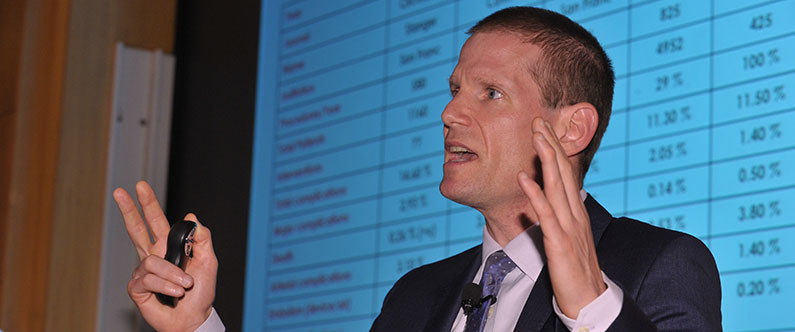WCM-Q’s Grand Rounds hears about quality and catheterization
 Prior to 2003, Dr. Holzer said, there were no standardized processes for reporting outcomes and risk adjustment in cardiac catheterization.
Prior to 2003, Dr. Holzer said, there were no standardized processes for reporting outcomes and risk adjustment in cardiac catheterization.
The question of how to ensure quality assurance in catheter procedures in children was the topic of this month’s Grand Rounds lecture at WCM-Q.
Cardiac catheterization in infants and children is a medical procedure used to diagnose and treat certain heart conditions. It involves an interventional cardiologist placing a long thin tube into a blood vessel that leads to the heart.
Dr. Ralf Holzer, director of cardiac catheterization & interventional therapy, and division chief cardiology (acting) at Sidra Medical and Research Center, told the audience of healthcare professionals at WCM-Q that prior to 2003 there were no standardized processes for reporting outcomes and risk adjustment in cardiac catheterization.
This began to change when Boston Children’s Hospital started to record detailed data from its own procedures and used this data to compare outcomes between operators. Other institutions joined the initiative and formed the ‘Congenital cardiac catheterization Project on Outcomes’ (C3PO), a prospective registry on catheterization procedures, he explained.
Dr. Holzer said:
“Until the first research paper was released I was unable to tell patients the exact chance of an adverse effect happening, but following that I was able to give patients and families very specific numbers. This meant that families and patients were able to get informed consent.”
Dr. Holzer went on to explain that every hospital could begin quality assurance and improvement programs, simply by collating information on a local level and ensuring it is monitored and shared with the relevant physicians and management. He said that the data capture should be consistent but emphasized that quality assurance and continuous quality improvement should not be seen as punitive. Instead it should be seen as a method of allowing individuals and programs identify potential areas for improvement.
Dr. Thurayya Arayssi, associate dean for continuing professional development, said:
“Quality assurance and improvement is at the very heart of continuing professional development. The Grand Rounds series is a great vehicle through which we can share knowledge, and by doing so ensure that we are all continually learning and improving so as to provide the patient with the very best of healthcare.”